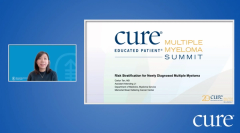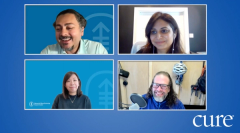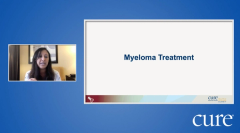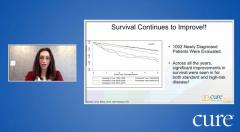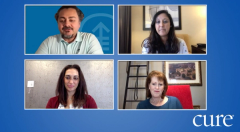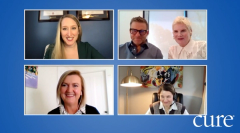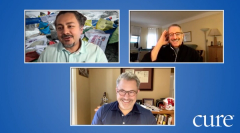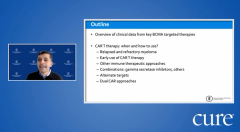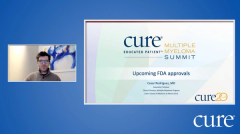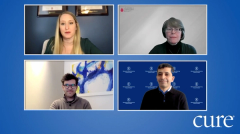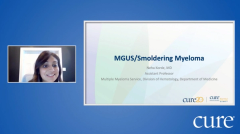
Educated Patient® Multiple Myeloma Summit MM4MM Keynote Lecture: March 12, 2022
Watch Dr. Saad Z. Usmani, Dr. Ben Marcus and Stan Wagner discuss their participation in the Moving Mountains for Multiple Myeloma program, during the CURE Educated Patient Multiple Myeloma Summit.
This panel featured Saad Z. Usmani, MD, MBA, Dr. Ben Marcus and Stan Wagner.
Usmani: I found this picture of ours. This was, I think, taken after we landed from the choppers and we, we were in line to get some coffee or something at that airport. But it's our four-year anniversary from that trek as well. And such a privilege to have both of you here to talk about that program.
I can start with Stan and then go to Ben, because I think the answer would be a bit different. Stan, I think the Moving Mountains program was kind of your brainchild to begin with. So tell us a little bit about that.
Wagner: I was born in Brooklyn, a coworker friend of mine, Tammy Slater, she actually came up with the idea of climbing Kilimanjaro for a cause. And she turned around and looked at me, we work in the same office, “Oh, we can do it for your cause, for myeloma.” And we got together with two other friends. And we definitely thought we could do this by ourselves, you know. And then we started to create a website and logistics became enormous. So I contacted somebody at MMRF, who put me in touch with somebody else. And then one evening, I was just looking at your magazine and contacted them. Just asking for a story. And Marty Murphy from CURE, called me up. And pretty much the rest is history. It became this huge thing, I think $3.5 million later, it's still going and it's I'm really proud to be part of it.
Usmani: Thanks for kicking that whole idea off. I'll go to Ben. When we met, you know, it was as if I had known you all my life. And, you know, the group got together so well, from the moment that all of us met. Tell me about, what inspired you to become part of this? You know, I'd love to hear your personal story.
Marcus: Yeah, mine’s a little odd. When I think back, I was diagnosed in December of 2016. And in January of 2017, so like, a month into treatment, still really no idea how things were going to go. I was. So I work as a physician. So I was at clinic and I was just kind of looking on the internet trying to learn about myeloma. And I actually ran into the MMRF page, and then clicked on to Moving Mountains. And I just decided you know what, and again the logic escapes me, and I said, I think I'll sign up for an Everest tr, because that'll give me something to look forward to. And then I didn't (know if there was a) real chance they would take me because I was just starting treatment. And there were so many questions up in the air. But Alicia, who ran the program, we had a great conversation. And I don't know if she didn't pick up on the fact that maybe I wasn't the healthiest. But she said you're in.
So the great part for me was my entire first year of treatment, which was, you know, probably the more difficult part, I had this goal of saying, “Alright, I got to get through this. So I can go climb to Everest base camp.” And at the time, it all seemed to make sense, like that would be a logical thing to do. But I'm super glad I did, because it really got me through that first year, and of course, those friendships from the trip have sustained me throughout.
Usmani: Those friendships on the trip actually, you know, changed my perspective on life as well. I mean, I signed up for it without, you know, really paying attention to what that commitment really meant. You know, in terms of preparation and trying to find time for myself to do that preparation. So, you know, for both of you, tell us a bit about those relationships, those bonds that you form during that trip?
Wagner: It was kind of instantaneous, my Kilimanjaro trek, the same thing. We met the first time for our practice hikes and bonded immediately. And it was just like a big family, everybody melded together perfectly. The same thing with the Everest trek. So now I have these two huge families.
But going back to preparation also is like, four years. I spent almost two years of those training. And I looked at some of the other guys on the hike on the first track: They were going to a gym, they're bodybuilders. They're doing this and I just, you know, not me. So I had a plan: three days at the gym at lunch and long walks on the weekend. So hikes upstate New York, and it got me through, so I'm not going to complain. But the family thing was, you know, that's the key, making a family immediately.
Marcus: I think the thing about myeloma is it's such a weird disease, right? You know, there's so many different types of cancer, but answers that you can suppress, and potentially, you know, have these wonderful improvements over the last number of years. But still, it's always there, right. And that's a really hard thing to comprehend. You know, even as someone who is in medicine to kind of have always had that little thing over your shoulder.
And I think one of the things that was so great about the trip is one, you got to see a whole bunch of people who were in the same spot as you kind of with the same attitude. Anyone who decided to go climb Mount Kilimanjaro, or Mount Everest, probably has some zest for trying to live. But those people and the medical staff that were on that, and the people that you know, work in advocacy, they get it. They know what it feels like to constantly have that little myeloma creature peeking over your shoulder. And so, you know, even just a couple days ago, one of the people from our trip texted me about something with their medical condition, and we get each other in a way that it's very hard to understand unless you've lived through that. And so I'm really grateful for those long-term friendships. I mean, it's four years ago, and we still all, you know, reach out every so often and stay in touch. Because, you know, that particular level of understanding and connection is hard to come by.
Wagner: Having a doctor like Saad on the team, is also a big plus. So you know, if I have a go-to question right away, and I can't find my doctor, which is the case more than more than I'd like, he's just there for me also, which is, I really appreciate that too.
Marcus: Yeah, we also asked them about 1000 questions. By the way, I got a lot of free medical advice.
Usmani: I think, you know, you guys, in return, changed my life and my perspective on life. And, you know, how precious life is and how important it is to have these relationships to take on these challenges in life and do it for a reason, do it for a cause. And, you know, I truly appreciate you guys, that's the gift that you gave me. That trip also made me realize, you know, that I need to pay attention to my health. And, you know, it really changed my own perspective on getting on board with other insurance events and continuing to raise, you know, funds for the cause.
I want to be, you know, cognizant of time. Why should other patients consider applying for this? What do you think, Stan?
Wagner: I think it's good to push yourself a little, you know, not every patient can. But it's better than sitting around and dwelling on it. I mean, to me, it was just okay, I could walk seven. Eight, 10 miles, I've never had that problem. Just throw in some extra exercise, cardio and that sort of thing. And, you know, some weightlifting. And I think most patients can do this. And it's just getting out of that shell.
Like Ben mentioned, you know, having that myeloma over your shoulder all the time, I kind of forgot about it for a long time. You know, at the beginning, I was really dwelling on it, researching and then as the years went by, it's like, I don't even go to this Facebook page anymore. The support group, I know I have it. It's not even over my shoulder anymore. I can't even think about it other than the fact that I have to go to treatment, and if I didn't, I probably forget about it even more.
Marcus: For me, the thing about these trips is that they're all about optimism and hope, right? They're not easy things to do, whether you're a patient or just a regular person. But now you know, the program has diversified. There are smaller hikes, there are different things that you can do, some of which are even just a day or two. But they basically put your name on the dotted line that you believe in the future, right, that you're going to be okay, that you're okay, now that life is still going on. And I think that the very act of participating in this is a positive vote for your attitude for your belief in the future. And I couldn't recommend it any more highly.
Usmani: What are your biggest takeaways from this whole experience so far?
Wagner: How much money we've raised. Why we've done it. I mean, that's the biggest takeaway, you know, climbing mountains is one thing, but doing it for a real good cause. And being somewhat successful. That, to me is the biggest takeaway.
Marcus: Yeah, for me, the biggest takeaway is the world's a huge place. And it's really nice to feel small, sometimes I'll never forget being in Nepal, when you're a patient and the cancer patients, sometimes you have a tendency to get in your own head a little bit. When you're sitting there, and you're looking at these beautiful vistas, it just changes the world, right? Whether you're worried about your job, or you're worried about your family, or you're worried about your health, when you're out there, and you see how amazingly large this world is, it changes your perspective. And so I think that it's never bad for a change of perspective, but it's vitally important for cancer patients, to snap them out of sometimes this negativity, and focus on all the beauty and wonder that's in the world.
Usmani: Nicely put. And, you know, I didn't want to bring up Kirk, but I can't end this session without talking about him a little bit. Because even though the two of you interacted with him for a short duration of time, you also recognized how full of life he was, the way that he spoke about faith and his convictions and disease. And, you know, how all of us are kind of woven together, you know, towards the same goal. I would love to get your take on those interactions with Kirk. For those of you listening, Kirk was one of my patients who was part of this trek, but more than a patient, he was a dear friend as well. And we ended up doing several together, and he passed away last year, during the pandemic. So, we are a part of that MM4MM family, and we continue to honor him and with the things that we do, Stan and Ben?
Wagner: He had such an easygoing attitude about everything. I don't think he ever looked down on anybody or anything in his entire life. That's what I got from him. And I had spoken to him, I think, maybe two or three days earlier before he's passed. And I was just like, “What are you doing the hospital?” You know, and he mentioned why and I thought things were going to go the right way. And three days later, he was gone. And, you know, I've lost friends to myeloma, but this was even more of an impact. It's like, surviving myeloma and losing your life because of COVID. It's just, that's just crazy.
Marcus: I think if I learned anything from Kirk, there are things bigger than ourselves, right? And that Kirk's faith was such an amazing part of who he was and how he dealt with the world and how he treated people. And I really mourn his loss. But I try to remember him by carrying on some of those things, and I learned a lot from him. And I think he would be pleased if he knew that one of his legacies was that it made all of us think about how we treat other people, how we interact with people, and honestly the prism with which he viewed the world. …He has left so much more behind that was impactful and positive and I’m very grateful to have known him.
Raw transcriptions have been lightly edited for clarity.
For more news on cancer updates, research and education, don’t forget to

